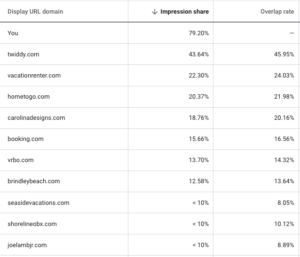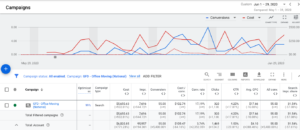Table of Contents
Since we are continuously adapting to “the new normal” and select industries are slowly re-opening their doors, it’s important to pay close attention to your pay-per-click campaigns to identify any external changes that could significantly impact metrics.
Here are the best ways to optimize your Google Ads campaigns:
- Review Auction Insights Weekly
- Bid On Your Brand Name
- Make Frequent Campaign Check-Ins
- Use a Few Months of Data to Make Decisions
- Stay Connected With Your Client
1. Review Auction Insights Weekly
Auction insights data is a great way to quickly get information on your competitors. It not only gives you the specific competitors that have overlapping keywords, but it also provides you with the impression share and overlap rate. Why is this important? Well, if we notice new competitors entering auction insights, this could mean a few things: higher CPCs, a lower impression share, and the need for a keyword, ad copy, and bid strategy review.
Related Content:
It also gives you the information needed for third-party tools like SEMrush and Ahrefs, so you can see how competitors are changing their PPC strategy. If we can pinpoint which companies are re-entering auction insights, we can make data-driven decisions to stay competitive on the SERP.
2. Bid On Your Brand Name
Although your website should show up in the top organic listing for your brand name, it’s likely there will be at least 1-2 competitors bidding for the top paid positions. This seems to be a fairly common strategy, making it even more important to invest in your brand keywords to dominate the SERP.
In order to ensure your company name shows up above competitors, it’s important to bid on your branded keywords, even if this means creating a brand-specific campaign to keep impression shares in the high 90s. Branded campaigns typically see the lowest cost per clicks and highest conversion rates, which can positively impact overall conversion averages.
3. Make Frequent Campaign Check-Ins
If you check client metrics at least twice a week, you’re more likely to catch sudden changes in competitors, spend, traffic, conversions, and conversion rate. Some questions I tend to ask myself when doing check-ins include:
- How are the conversion metrics trending month over month? Week over week? (see image below)
- Have there been any spikes in spend or bounce rate?
- How has the bidding strategy impacted cost per click?
- Have there been any website changes?
Although some campaign changes need at least a week for the Google algorithms to properly optimize, it’s still good to check on bid strategy or keyword changes frequently to ensure they haven’t caused any drastic performance changes. At the end of the day, the goal is to increase ROI, so we should be proactively monitoring keywords, searched terms, and Google Analytics data each check-in.
4. Use a Few Months of Data to Make Decisions
Since external factors might have significantly impacted metrics, it’s important to look at a larger date range before making keyword optimizations. Keywords that were once performing well might not have the same optimal performance right now.
Before the pandemic, I was generally reviewing keyword data for the last 30-60 days before changing match types or pausing due to minimal conversions. Now I’m taking a more expansive approach by reviewing data as far back as four months to really understand if a conversion drop was solely COVID-related or if there might be another cause. Since we always want to make data-driven decisions, we need to take a deeper look and ask ourselves some additional questions, such as:
- Has the landing page changed?
- Do we need to reconfigure conversions?
- Are there still competitors in auction insights?
- Does that ad copy reflect the right tone?
- How does the current quality score compare to February or March?
For example, one of my clients saw conversions drop to zero for a set of keywords once COVID-19 started impacting business in late March/early April. Nonetheless, the keywords were still getting impressions, the ads were still getting clicks, the landing pages hadn’t changed. Additionally, competitors were still present in auction insights. So, how does a conversion drop this large make sense?
In most cases, people were researching a particular product or service but weren’t ready to make a purchase. After reviewing the last few months of keyword data, I decided to leave the highest converting keywords active as I monitored bounce rate, impression share, and auction insights, which saved the account from detrimental results. With various industries and states recently easing up on quarantine guidelines, the conversions began trickling in with an even higher conversion rate than previously seen. The bottom line is that you might need to look at three, four, or even five months of data before removing a keyword that was previously converting. Otherwise, you might miss out on conversion opportunities that could have an even longer-lasting impact on revenue and ROI.
5. Stay Connected With Your Client
One of the most important ways we can help our clients navigate these uncertain times is to reach out and check-in on their revenue goals between strategy calls. If we can understand how leads and revenue are trending on a weekly basis, we can modify the PPC campaigns as needed. Google Ads only shows us a piece of the pie, so we need to be proactive in speaking with the client and taking a deeper look into Google Analytics for any further insights.
Conclusion:
While optimizing your Google Ads campaigns can be challenging, there are numerous ways to stay on top of trends that might be impacting performance. As long as you keep your client’s goals top of mind and check on metrics frequently, you’ll be able to make data-driven decisions to drive a positive ROI.
How do you optimize your Google Ads campaigns? Let me know down in the comments!
Search News Straight To Your Inbox
*Required
Join thousands of marketers to get the best search news in under 5 minutes. Get resources, tips and more with The Splash newsletter:


